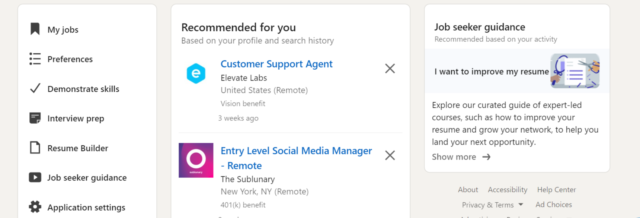Have you ever imagined having a job where the world is your office? A place where you could work from a bustling city café one day and a serene beach the next? If you’re wondering how to find remote jobs that offer this level of flexibility and freedom, you’re certainly not alone.
Rakuten – Join Rakuten Today and Get a $10 Cash Bonus
Swagbucks – Join Swagbucks to claim your $10 Bonus
Respondent – Join Respondent to make up to $20 A Day
Survey Junkie – Take Surveys and Get paid with
Click HERE to Claim some FREE stuff
The pursuit of remote work has become increasingly popular, promising a more personalized work-life balance. In this guide, I’ll reveal the secrets to securing remote positions, helping you transform the dream of working from anywhere into your reality.
Strategies for Finding Remote Jobs
Securing the ideal remote job involves a blend of thoughtful strategy, consistent effort, and knowing the right places to search.
Start with specialized job boards such as We Work Remotely, Remote.co, and FlexJobs, which feature remote positions across various industries, simplifying your search.
Networking also plays a crucial role in uncovering opportunities, with many positions being filled through recommendations and connections made on platforms like LinkedIn.
Additionally, social media can serve as a powerful tool in your job hunt, offering a way to follow companies you admire, engage with professionals in your field, and join discussions related to remote work opportunities.

Crafting a Winning Application
When applying for remote roles, it’s essential to tailor your application to showcase your suitability for this mode of work.
Adjust your resume to highlight how your past experiences have equipped you for a remote position, focusing on skills such as self-motivation, effective time management, and proficiency with digital communication tools. If you’ve worked remotely before, make sure this is clear and front and center.
If not, concentrate on the transferable skills you possess that are crucial for successful remote work, including your ability to work independently, take initiative, and communicate effectively in writing.
Preparing for Remote Job Interviews
Preparing for interviews for remote positions involves more than just understanding the role and its requirements. It’s about demonstrating your capability to work effectively outside of a traditional office setting.
Practice for video interviews, ensuring you are comfortable with the technology and can present yourself professionally on screen. It’s also important to articulate clearly how you manage your time, stay organized, and communicate with team members in a remote environment.
Share specific examples of how you’ve successfully managed projects or collaborated with others from a distance. This preparation shows potential employers that you’re not just ready for remote work but that you can thrive in it.

Avoiding Scams
In the search for remote jobs, it’s crucial to stay vigilant against scams, which are unfortunately all too common in the remote job market. Research companies thoroughly before applying to ensure they are legitimate.
Be wary of job offers that seem too good to be true or that ask for personal information or payment upfront. Legitimate employers will not require payment as part of the hiring process.
Trustworthy resources and job boards typically vet the listings they post, but it’s still important to do your own due diligence. Recognizing red flags and conducting thorough research can protect you from falling victim to scams.
Utilizing LinkedIn’s Job
First things first, let’s talk about LinkedIn’s job search functionality. It’s incredibly user-friendly and can be tailored specifically to uncover remote opportunities. Here’s how you can make it work for you:
- Start by using the search bar at the top of your LinkedIn homepage. Select ‘Jobs’ and then enter keywords related to your desired position or field.
- Once you have a list of jobs, use the ‘Location’ filter to select “Remote.” This filter is a powerful tool that helps narrow down your search to only remote positions, saving you time and effort.
- Don’t forget to set up job alerts! By creating alerts for your specific search criteria, you’ll receive notifications directly to your inbox whenever new roles that match your interests are posted.
Tips for Optimizing Your LinkedIn Profile to Attract Recruiters
Your LinkedIn profile is essentially your online resume and first impression to potential employers. Making sure it’s optimized for remote job opportunities is crucial:
- Ensure your headline clearly states your expertise and your interest in remote work. For example, “Digital Marketing Specialist | Seeking Remote Opportunities.”
- In your summary, mention your remote work experience and skills that make you a great candidate for remote roles, such as self-discipline, time management, and proficiency with digital collaboration tools.
- Highlight any previous remote work arrangements or projects in your experience section. This shows potential employers that you’re no stranger to the remote work setup.

Networking Strategies on LinkedIn to Connect with Industry Professionals
Networking on LinkedIn can open doors to opportunities that aren’t advertised on job boards. Here are some strategies to enhance your networking efforts:
- Connect with people in your industry, including recruiters, hiring managers, and peers. Personalize your connection requests with a brief message about your interest in remote work and how you admire their career or company.
- Participate in relevant groups and discussions. This increases your visibility and demonstrates your expertise and enthusiasm for your field.
- Share and comment on content related to your industry and remote work. This can help establish your professional brand and make you more memorable to potential employers.

Building Skills for Remote Work
One of the key ways to stand out is by honing the skills that are essential for remote work. Let’s explore how you can identify and develop these crucial abilities, ensuring you’re ready to thrive in a remote work environment.
Identifying Key Skills Needed for Successful Remote Work
Remote work requires a unique set of skills compared to traditional office jobs. Here are some of the most important ones:
- Self-discipline: The ability to stay focused and productive without direct supervision is crucial.
- Time management: Managing your time effectively is key to meeting deadlines and balancing work-life integration.
- Digital communication: Since most, if not all, communication will be done virtually, being able to express yourself clearly through digital channels is essential.
- Tech-savviness: Familiarity with digital tools and platforms used for collaboration and project management is a must.
- Adaptability: The remote work environment can change rapidly, so being able to adjust quickly is important.
Online Resources and Courses to Improve Digital Communication and Time Management
Thankfully, the internet is filled with resources to help you build these skills. Here are a few recommendations:
- For self-discipline and time management: Look for courses on platforms like Coursera or Udemy that focus on productivity and personal development. Courses like “Time Management for Personal & Professional Productivity” can provide you with strategies to manage your schedule effectively.
- For digital communication: Platforms such as LinkedIn Learning offer courses on effective online communication, helping you master the art of virtual collaboration.
- For tech-savviness: Familiarize yourself with tools like Slack, Zoom, Asana, or Trello through their own tutorials or broader courses on digital workplace tools.
Importance of Continuous Learning and Adaptation
The world of remote work is always evolving, and so should your skills. Staying up-to-date with new tools and best practices is crucial for long-term success in remote roles. Here’s how you can continue to grow:
- Follow industry leaders and influencers on platforms like LinkedIn or Twitter to stay informed about trends in remote work.
- Join online communities related to remote work. Forums, LinkedIn groups, or Slack channels can be great places to exchange tips and experiences with other remote workers.
- Attend virtual conferences and webinars to learn from experts and network with potential employers or collaborators.

Conclusion
Finding a remote job that fits your life and career goals takes time, persistence, and a strategic approach. By leveraging the right job boards, expanding your network, and tailoring your application to highlight your remote work capabilities, you’ll improve your chances of landing a remote position.
Preparing thoroughly for interviews and staying alert to avoid scams are also key steps in the process. Remember, the path to finding a remote job is a journey, and with the right approach, it’s one that can lead to rewarding opportunities. Keep pushing forward, stay optimistic, and use the strategies outlined in this guide to help you navigate your way to your ideal remote job.
How to find remote jobs FAQ
Where can I find remote jobs?
Remote jobs can be found on specialized job boards such as We Work Remotely, Remote.co, and FlexJobs, as well as on larger platforms like LinkedIn and Indeed by filtering for remote positions. Additionally, joining remote work-focused communities and forums can lead to job opportunities shared within those networks.
How do I know if a remote job posting is legitimate?
To determine if a job posting is legitimate, research the company’s online presence and read reviews from current and former employees on sites like Glassdoor. Be wary of postings that require payment for job opportunities or offer unusually high compensation for minimal work. Trustworthy postings typically include detailed job descriptions and requirements.
What skills are important for remote work?
Key skills for remote work include self-discipline, time management, strong digital communication abilities, proficiency with online collaboration tools, and adaptability. Developing these skills can significantly enhance your effectiveness as a remote employee.
How should I prepare for a remote job interview?
Prepare for a remote job interview by testing your technology in advance, ensuring a quiet and professional background, and practicing answers to common remote work-related questions. It’s also important to demonstrate your ability to work independently and your familiarity with digital communication tools.



